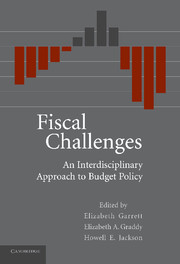Book contents
- Frontmatter
- Contents
- Preface
- Contributors
- PART ONE THE LAW AND POLITICS OF FISCAL POLICY
- PART TWO UNDERSTANDING FEDERAL DEFICITS AND PUBLIC DEBT
- PART THREE BUDGETING AND FISCAL CONSTRAINTS AT THE STATE LEVEL
- PART FOUR INTERGOVERNMENTAL ASPECTS OF BUDGET POLICY
- PART FIVE JUDICIAL POWERS AND BUDGET POLICY
- Index
PART THREE - BUDGETING AND FISCAL CONSTRAINTS AT THE STATE LEVEL
Published online by Cambridge University Press: 23 December 2009
- Frontmatter
- Contents
- Preface
- Contributors
- PART ONE THE LAW AND POLITICS OF FISCAL POLICY
- PART TWO UNDERSTANDING FEDERAL DEFICITS AND PUBLIC DEBT
- PART THREE BUDGETING AND FISCAL CONSTRAINTS AT THE STATE LEVEL
- PART FOUR INTERGOVERNMENTAL ASPECTS OF BUDGET POLICY
- PART FIVE JUDICIAL POWERS AND BUDGET POLICY
- Index
Summary
This section explores the impact of different institutional arrangements and budgetary practices on state fiscal behavior. How do constitutional and legislative budgetary processes affect state fiscal decision making, and what insights are provided to our understanding of these processes more generally? Because states in the United States regularly change their budgetary processes, yet share many social, economic, and cultural characteristics, they offer a potentially rich environment in which to explore the consequences of changes in the arrangements that govern fiscal decision making.
The three chapters that make up this section combine empirical and theoretical analyses of these questions and continue this book's multidisciplinary perspective. The authors in this section, who include political scientists and economists, all bring a policy analytic perspective to our understanding of fiscal behavior – focusing on the impacts of changing processes on fiscal outcomes.
In Chapter 8, Juliet Ann Musso, Elizabeth A. Graddy, and Jennifer Bravo Grizard provide an overview of state budgetary practices and review the insights that empirical research has provided about their likely impacts on fiscal performance. They document considerable variation across states in eleven of the budgetary practices that most commonly enter the debate about budgetary reforms. Their analysis of recent empirical work, however, finds little indication that most changes in budgetary practices will improve fiscal performance. Only “hard” balanced-budget requirements show promise, and that assumes an effective enforcement mechanism either by the legislature or the courts.
Information
- Type
- Chapter
- Information
- Fiscal ChallengesAn Interdisciplinary Approach to Budget Policy, pp. 249 - 250Publisher: Cambridge University PressPrint publication year: 2008
